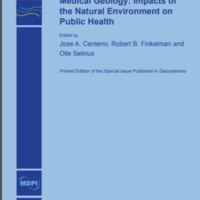Medical Geology: Impacts of the Natural Environment on Public Health
Dublin Core
Title
Medical Geology: Impacts of the Natural Environment on Public Health
Subject
Medical
Description
B. anthracis infections in wildlife and livestock have been recognized as a critically important disease in the United States for over 200 years. Historical data on environmental, weather/climate and geographical factors that influence the occurrence of these infections are well known and include; (1) warm seasons during dry periods that follow moderate to heavy precipitation events
(weather/climate); (2) regions containing post-flood organic detritus and/or short dry grazing grasses (environmental); and (3) topological lows, such as waterholes or riverbanks, calcareous and alluvial soils with elevated nutrient content and pH values greater than 6.0 (geology). Other geological factors that may influence B. anthracis outbreak occurrence, as noted through in vivo or
in vitro observations, are elevated phosphate (which results in higher protective antigen production), magnesium, sodium, copper, zinc (needed for lethal factor production) and manganese (typically found in very low concentrations in calcareous soils and needed for gene regulation of exotoxins and antibiotics) [1–5].
(weather/climate); (2) regions containing post-flood organic detritus and/or short dry grazing grasses (environmental); and (3) topological lows, such as waterholes or riverbanks, calcareous and alluvial soils with elevated nutrient content and pH values greater than 6.0 (geology). Other geological factors that may influence B. anthracis outbreak occurrence, as noted through in vivo or
in vitro observations, are elevated phosphate (which results in higher protective antigen production), magnesium, sodium, copper, zinc (needed for lethal factor production) and manganese (typically found in very low concentrations in calcareous soils and needed for gene regulation of exotoxins and antibiotics) [1–5].
Creator
-
Source
https://www.mdpi.com/books/pdfview/book/182
Publisher
MDPI - Multidisciplinary Digital Publishing Institute
Date
2016
Contributor
Baihaqi
Rights
Creative Commons
Format
Ebooks
Language
English
Type
Textbooks
Files
Collection
Citation
-, “Medical Geology: Impacts of the Natural Environment on Public Health,” Open Educational Resource (OER) - USK Library, accessed April 24, 2025, http://202.4.186.74:8004/oer/items/show/3020.


